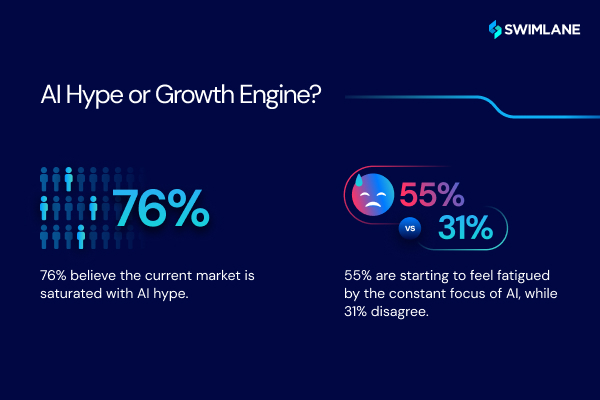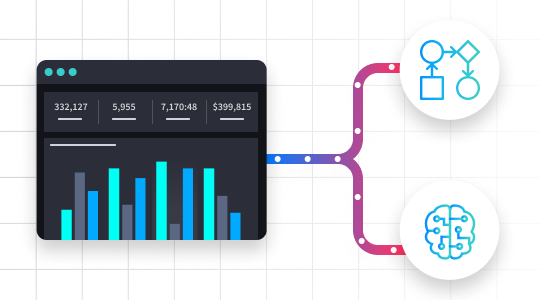The rapid evolution of artificial intelligence (AI) is sending shockwaves through the cybersecurity landscape, and the workforce is feeling the tremors. This isn’t just about automating tasks; it’s about a fundamental shift in cybersecurity skills, roles, and expertise required to defend against increasingly sophisticated cyber threats. But with the market saturated by overhyped AI claims, how can organizations discern the effective tools from the noise? And as AI transforms security operations, how is it reshaping the foundation of the cybersecurity workforce?
To help answer these questions, we recently partnered with Sapio Research to survey 500 cybersecurity leaders across the US and the UK to explore the ongoing debate around AI.
This blog is the second in a three-part series summarizing both the research data and the expert perspectives shared during a recent Swimlane webinar, AI Reality Check: CISOs Unpack its Role in Cybersecurity, where TAG Cyber CEO and former AT&T CISO Ed Amoroso joined Swimlane CISO Michael Lyborg to discuss key findings.
Continue reading to explore how AI’s strategic value cuts through the hype to enhance security defenses and why demand for AI expertise is essential to the cyber workforce. Download the full report for a deeper dive: Is AI Living Up to Its Cybersecurity Promises?
AI Hype or Growth Engine?
The rapid proliferation of AI tools in cybersecurity has created a paradox. While AI technology shows immense promise, the market’s saturation with exaggerated claims from vendors is making it harder than ever for organizations to identify effective solutions.
In fact, according to the report, 76% of cybersecurity professionals agree that the current landscape is overwhelmed by AI hype. This constant over promotion of AI from vendors has left 55% of respondents feeling fatigued from the constant media buzz, with some expressing frustration over the misuse of the “AI-powered” label for tools that offer little to no AI capabilities.

Tip: To help cut through the noise, organizations should do thorough research and prepare the right questions to ask AI security vendors. This approach will help identify those offering real AI use cases and measurable ROI, ensuring a more informed decision-making process.
To help get you started, here is a blog from Swimlane’s director of product management on 8 Must-Ask Questions for AI Security Vendors.
Despite the noise, the importance of AI in cybersecurity cannot be understated. Its ability to:
- Enhance threat detection and prediction
- Automate repetitive tasks to reduce SOC analyst burnout
- Scale security operations to meet evolving threats
…places it at the center of modern security strategies that organizations need. As threat actors increasingly use AI to innovate and enhance their attacks, organizations must respond by “fighting AI with AI.”
By implementing AI and machine learning (ML), security operations (SecOps) teams can improve productivity and efficiency to combat threat actors, prevent cyberattacks, and focus on more strategic, complex cybersecurity tasks.
Are AI Skills Essential to the Cyber Workforce?
While some worry about AI displacing jobs, the reality is that it’s creating new opportunities for professionals with the right skills. A staggering 86% of organizations report that AI and ML expertise significantly influence their hiring decisions.

The Growing Demand for AI Skills
Organizations are actively seeking professionals with AI and ML expertise to develop, implement, and manage AI-driven security solutions. Rather than eliminating jobs, AI is reshaping the cybersecurity workforce by increasing demand for:
- Analysts capable of leveraging AI tools to predict and mitigate risks
- Engineers skilled in developing AI and ML-driven solutions
- Leaders who can strategically implement AI to drive business objectives
Organizations that prioritize upskilling their teams to harness AI’s potential will strengthen their cybersecurity defenses and attract top talent. For candidates, demonstrating proficiency in AI and ML is becoming a “must-have” for staying competitive in the job market.
In the recent Swimlane webinar, Lyborg and Amoroso both agreed that AI will undoubtedly impact staffing and organizations will likely prioritize candidates with AI skills when evaluating potential hires. While these expertise aren’t required, Lyborg and Amoroso noted that basic knowledge of AI and its architecture will become a key minimum requirement.
Tip: To stay competitive, cybersecurity professionals should prioritize becoming familiar with AI in cybersecurity and developing AI skills.
To help get you started, here is another blog from Swimlane’s director of product management on 7 AI Use Cases in Cybersecurity.
Beyond the Hype: AI as a Strategic Enabler
It’s become clear that AI is no longer just hype but a strategic enabler for cybersecurity. Organizations that focus on practical AI applications and cut through market noise will enhance their security posture and stay ahead of evolving threats.
The Future of AI in Cybersecurity
While the market may be saturated, AI in cybersecurity isn’t going anywhere. AI has the potential to revolutionize the way organizations solve cybersecurity use cases, from threat detection and incident response to risk management and compliance. As AI technologies continue to mature and organizations gain a better understanding of their practical applications, AI is poised to become a true growth engine for the cybersecurity industry.
Key Takeaways:
- AI is more than just hype: It offers tangible benefits for cybersecurity.
- AI skills matter: Cybersecurity professionals with AI expertise are highly sought after.
- The right questions cut through market noise: Organizations should prepare questions to help filter out market noise and ensure vendors demonstrate proven AI use cases and a track record of delivering ROI.
- Focus on practical applications: Organizations should prioritize AI solutions that deliver real value.
- AI is a strategic enabler: AI helps organizations enhance their security posture.
- The future is bright: AI will fuel cybersecurity innovation and growth.
By embracing AI with a strategic mindset and focusing on these key takeaways, organizations will unlock its full potential to strengthen defenses and lead in the digital age.

Is AI Living Up to Its Cybersecurity Promises?
The cybersecurity world is buzzing with the rapid adoption of AI, especially tools like generative AI and LLMs. These technologies are boosting productivity and attracting serious investment, but they also bring up big questions about responsible use, data security, and even “AI hype fatigue.”


